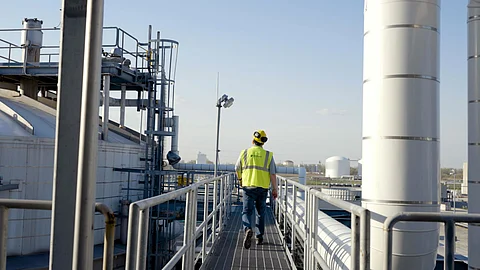

"We have a tangible, proven product that is making a difference for the aquaculture industry," said Gertjan de Koning, CEO of Veramaris, commenting on the production and environmental footprint milestones achieved in 2023.
Photo: Veramaris.
The Netherlands-based algae oil producer, Veramaris has announced that it increased its production volume by 50% in 2023 (using 2021 as a baseline). The company was responding to the growing demand for alternative sources of Omega-3, EPA, and DHA for aquafeed, and doing so with only a marginal increase in its greenhouse gas emissions.
"2023 marks a pivotal year for Veramaris, as we not only achieved a record increase in production volumes but also solidified our market position. We are now poised to scale up sustainably, streamlining our production processes and forging new partnerships," said Veramaris CEO Gertjan de Koning.
"Veramaris is no longer just a start-up with an idea – we’re here to stay. We have a tangible, proven product that is making a difference for the aquaculture industry," he added.
As Veramaris' CEO highlighted in the company's sustainability report, in recent years, the aquaculture industry has faced challenges in addressing the health and welfare of fish and shrimp, and Omega-3 is a vital component in achieving this. "Feed composition – and EPA & DHA – are part of the solution to this problem," he said.
In part due to this increased awareness of the health benefits derived from Omega-3, global demand for these essential fatty acids is on the rise, and Veramaris has been at the forefront of addressing that growing need, which has increased in parallel with the global trend toward greater demand for healthy aquaculture and seafood.
Nevertheless, in 2023, this demand was compounded by an additional problem. Already limited ocean fish oil stocks (the main source of EPA and DHA) became even more uncertain following the effects of El Niño, which caused a 21% drop in total cumulative fish oil production compared to the previous year. However, as Gertjan de Koning pointed out, this supply shortfall was not entirely unforeseen.
"The industry has long predicted the need for a fish oil alternative that doesn’t put pressure on marine resources. And that’s where Veramaris algal oil comes in," he explained. "In 2023, alongside a rapidly widening EPA & DHA supply gap, global demand for aquaculture and Omega-3 continued to grow. The market price of fish oil rose exponentially, increasing interest in our product. Many of our customers had already tested and approved our algal oil in their fish feed formulations, so the scene was set for us to ramp up our operations to meet this demand."
In the results reported by Veramaris, there is another striking fact. This 50% increase in production volumes was achieved with an increase of only 3% in its total greenhouse gas emissions. In other words, this significant production growth was achieved with only a marginal increase in its environmental footprint.
"Our algal oil is now a mainstream ingredient used by major aquafeed producers, as well as in pet food and human supplements," said Veramaris CEO. "Knowing our supply chain partners rely on us to continuously reduce our product’s carbon footprint, we were also proud this year to register an impressive 27% lower product carbon footprint with the release of an updated Environmental Product Declaration."
"This was possible thanks to the many initiatives we have been taking to simultaneously decarbonize and improve the efficiency of our operations, resulting in only a small increase in our absolute GHG emissions. At the same time, we have substantially increased our production volume, leading to a reduction in the product carbon footprint per unit of algal oil produced," he added.
In early 2024, the company also received - after a three-year registration process - the first marketing authorization in Canada to include algal oil in feed for salmonid species. Therefore, according to de Koning, now is the time for Veramaris to grow sustainably, streamlining its production processes and forging new alliances, such as its partnership with Cargill for the regenerative agriculture supply chain.
From its headquarters in Delft, The Netherlands, to its production facility in Blair, Nebraska, Veramaris is committed to supporting the growth of aquaculture by offering the world's richest source of Omega-3, EPA, and DHA through its ASC-MSC certified algal oil for fish and shrimp feed.
By harnessing nature's original source of Omega-3, Veramaris helps ensure the nutritional quality of aquaculture feed for better animal health and performance, and less waste, also helping to meet the growing demand for more nutritious, higher quality seafood without increasing pressure on fisheries.
